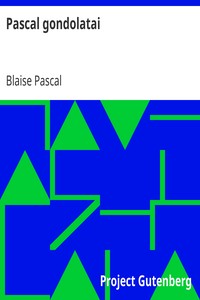Pascal gondolatai by Blaise Pascal
"Pascal gondolatai" by Blaise Pascal is a collection of fragments written in the 17th century. Left incomplete at Pascal's death in 1662, these notes were intended as a defense of Christianity. The work presents Pascal's skepticism of traditional proofs for God's existence and argues that faith requires seeking with the heart, not just reason. It includes the famous "Pascal's wager" and challenges both atheist arguments and shallow religious thinking. First published in
1670, the fragments' intended order remains debated, influencing philosophers from Heidegger to Sartre. (This is an automatically generated summary.)
Read or download for free
| How to read | Url | Size | |||
|---|---|---|---|---|---|
| Read now! | https://www.gutenberg.org/ebooks/76165.html.images | 316 kB | |||
| EPUB3 (E-readers incl. Send-to-Kindle) | https://www.gutenberg.org/ebooks/76165.epub3.images | 211 kB | |||
| EPUB (older E-readers) | https://www.gutenberg.org/ebooks/76165.epub.images | 205 kB | |||
| Kindle | https://www.gutenberg.org/ebooks/76165.kf8.images | 377 kB | |||
| older Kindles | https://www.gutenberg.org/ebooks/76165.kindle.images | 353 kB | |||
| Plain Text UTF-8 | https://www.gutenberg.org/ebooks/76165.txt.utf-8 | 289 kB | |||
| Download HTML (zip) | https://www.gutenberg.org/cache/epub/76165/pg76165-h.zip | 176 kB | |||
| There may be more files related to this item. | |||||
Similar Books
About this eBook
| Author | Pascal, Blaise, 1623-1662 |
|---|---|
| Translator | Béri, Gyula, 1860-1902 |
| Uniform Title | Pensées. Hungarian |
| Title | Pascal gondolatai |
| Original Publication | Budapest: Franklin-Társulat, 1890. |
| Note | en.wikipedia.org/wiki/Pens%C3%A9es |
| Credits | Albert László from page images generously made available by the HathiTrust Digital Library |
| Reading Level | Reading ease score: 58.9 (10th to 12th grade). Somewhat difficult to read. |
| Language | Hungarian |
| LoC Class | B: Philosophy, Psychology, Religion |
| Subject | Apologetics -- Early works to 1800 |
| Subject | Catholic Church -- Doctrines -- Early works to 1800 |
| Subject | Catholic Church -- Apologetic works -- Early works to 1800 |
| Category | Text |
| EBook-No. | 76165 |
| Release Date | May 26, 2025 |
| Copyright Status | Public domain in the USA. |
| Downloads | 173 downloads in the last 30 days. |
| Project Gutenberg eBooks are always free! | |

